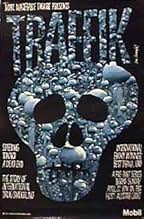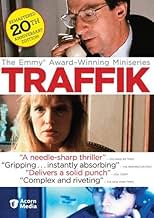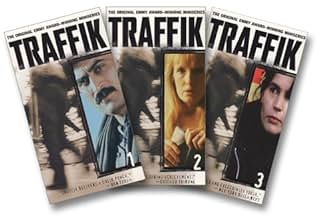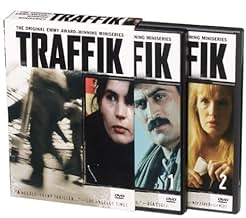ÉVALUATION IMDb
8,4/10
1,6 k
MA NOTE
Ajouter une intrigue dans votre langueThe Hamburg police arrest an international businessman, charging him with smuggling heroin from Pakistan. While he's on trial, his trophy wife, a former Olympic swimmer, discovers steely rut... Tout lireThe Hamburg police arrest an international businessman, charging him with smuggling heroin from Pakistan. While he's on trial, his trophy wife, a former Olympic swimmer, discovers steely ruthlessness within herself.The Hamburg police arrest an international businessman, charging him with smuggling heroin from Pakistan. While he's on trial, his trophy wife, a former Olympic swimmer, discovers steely ruthlessness within herself.
- A remporté le prix 4 BAFTA Awards
- 7 victoires et 4 nominations au total
Parcourir les épisodes
Avis en vedette
9=G=
"Traffik 1989" is an Emmy award winning six part miniseries out of the UK which was the inspiration for the Oscar winning "Traffic 2000". The five hour film breaks down the opium/heroine trade for the viewer from the handcasting of poppy seeds in an Afghanistan field to the "head rush" of a mainlining junkie in a flat in England. Not only does "Traffik" offer entertainment value through interleaved dramatic stories it also provides an overview of the international drug trade at all levels answering the who, where, how, and why questions of the age old and unstoppable narcotic supply/demand machine. Synergistically entertaining and educational, "Traffik" will prove to be time well spent for teens and up. (A)
Two German police detectives and a British member of parliament attempt to thwart the activities of international drug smugglers. Television mini-series details the mechanisms of the unstoppable heroin trade from Pakistan to London and the lives it destroys. But acting, script and plot are anything but T.V. quality. Superior to pale imitation "Traffic" (2000). (Rating: A)
I can only agree with many observers that Traffik is one of the most memorable dramas ever made for television. I saw Traffik when it was on TV, and I have just watched it again. I am particularly moved by the haunting original music of Tim Souster, and especially by the dolorous strains of Dmitri Shostakovich's Chamber Symphony in C minor ( the music over the credits and in parts of the film). The music intensifies the desperation of the characters as they pursue their sad fate. The music is powerfully emotional. This arrangement combines two of the movements from the symphony, but I recommend listening to the symphony per se.
If you've not seen this then look out for it. It is available on DVD. It is a channel 4 (uk) production, possibly, in conjunction with German and danish TV. If you've seen the film it is basically the same plot. Several interleaved stories are connected through the drugs trade. The story jumps between the housewife (played by the excellent Lyndsay Duncan) trying to complete a deal on behalf of her husband, who to her surprise is an international drugs dealer (and generally dangerous man).
A minister, who is embedded in his job to the detriment of his family, is investigating the whole state of affairs with international drugs trafficking. He gets a few eye openers to the reality of heroin when his daughter turns out to have a 'problem'. He then visit Pakistan, officially, where he seems to be taught that the abuse (not simply the drug or its casual use) is the problem and also gets to sample some produce (an excellent scene where he simultaneously realises what the attraction is and why it is and why it is such a problem). In Pakistan we get to see the other side. The desperation of farmers who can barely survive turning to opium production and crime lords. The pointless attempts at subsidy resulting in the system getting rich. And a country so drenched in drugs yet only a relative fraction of the abuse we have in the west. Around all this a customs official/interpol agent tries to catch the 'dutch' connection in heroin smuggling. Seeking justice for his murdered partner. This really is a masterpiece. Super, understated performances from all the main actors in a way only European cinema can really do.
A must see. Especially if you have seen the film, they compliment each other abd present some subtly different opinions/attitudes from both sides of the pond.
A minister, who is embedded in his job to the detriment of his family, is investigating the whole state of affairs with international drugs trafficking. He gets a few eye openers to the reality of heroin when his daughter turns out to have a 'problem'. He then visit Pakistan, officially, where he seems to be taught that the abuse (not simply the drug or its casual use) is the problem and also gets to sample some produce (an excellent scene where he simultaneously realises what the attraction is and why it is and why it is such a problem). In Pakistan we get to see the other side. The desperation of farmers who can barely survive turning to opium production and crime lords. The pointless attempts at subsidy resulting in the system getting rich. And a country so drenched in drugs yet only a relative fraction of the abuse we have in the west. Around all this a customs official/interpol agent tries to catch the 'dutch' connection in heroin smuggling. Seeking justice for his murdered partner. This really is a masterpiece. Super, understated performances from all the main actors in a way only European cinema can really do.
A must see. Especially if you have seen the film, they compliment each other abd present some subtly different opinions/attitudes from both sides of the pond.
Now that Steven Soderbergh's engrossing big-screen adaptation of the superb made-for-the-tube production, Traffik, has been logged in, it would be almost impossible not to compare the two. Traffic, the movie, is certainly some very good work by a true artist of the cinema. But to achieve the maximum appreciation of both, see Traffic before you see Traffik. With its mere 147-minute running time, as well as the often-unavoidable dilution of reality that can be the karma of films that feature big-name stars, the deck is somewhat stacked against the movie. It simply has to much to do, although it tries bravely. Traffik, at nearly five hours in length, has the time to construct an intimate, highly detailed world as coherent as a length of wire rope. Once you have been through the mini-series, the movie, despite the excellence of many of its elements, seems almost like a trailer at times.
In Traffik, we're talking heroin, not cocaine, and from the very ground up; opium poppies in full bud, swaying gently in the breeze, ripe for slitting, looking like powder-blue-gray visitors from another world. The innocuous resin oozes and, collected, makes its surprisingly simple transition into heroin. From there, the finished product makes its own journey into a world filled with indubitable people. Only three `names' populate the cast of Traffik. The always-excellent Bill Paterson is the British Minister Jack Lithgow, struggling with his conscience on the cusp of signing an aid deal with almost laughably corrupt Pakistani opposite numbers. (John Le Carre fans can see Paterson, and appreciate his range, as the obsequious Lauder Strickland in the BBC/PBS production of `Smiley's People'.) Julia Ormond, in one of her first roles, plays the Minister's spoiled, smacked-out daughter. Scottish character actress Lindsay Duncan, more well-known on the continent than here, embodies the wife of the busted drug importer (the Zeta-Jones role in the movie). She's a former Olympic Medalist in swimming who, with hubby on serious ice, finds her true calling. (In Traffik the husband is a smooth German construction contractor.) From then on we, certainly we in America, know no one, although many of Traffik's actors have significant careers in their own zones. This, and the terse direction give Traffik an almost documentary feel. The strange, slightly howling music track adds just the right amount of the sinister and we are locked in. (Director Alistair Reid also directed the charming adaptation of Armistead Maupin's Tales of the City, which ran as a serial for several years in the San Francisco Chronicle during the paper's Herb Caen era.)
Both Traffic, and Traffik, have very distinct beating hearts. On the big screen, it's Benicio Del Toro's Mexican cop, a man of definite parts, who has learned to walk the crumbling walls of a culture whose floor has collapsed into a corrupt and poverty-stricken basement. In Traffik, it's the beautifully-drawn relationship between the poppy farmer, Fazal (Jamal Shah), and the Pakistani heroin kingpin, Tariq Butt (Talat Hussain). Fazal, driven from his fields by the Pakistani Army's faux crackdown on drugs, hitches to Karachi in search of work. There, he eventually becomes ensnared by Butt, the Sauron of traffickers. The slightly adrogynous Talat Hussain, a major star in Pakistan, has an unusual and powerful speaking voice, like polished mahogany with a Brit accent. When he sneeringly refers to Fazal as `Farm Boy', it actually hurts. (He is also well-known in Pakistan for his recordings of the Quran in Urdu.) Hussain creates a villain of suave, almost hypnotic evil. It's a great and effortless performance, in the very front rank of all bad guys ever portrayed. Against it is Jamal Shah's noble, almost angelic man of the soil whose innocence allows him to draw too near to the harsh flame of Tariq Butt's power. The entire cast of Traffik is excellent but the powerful interaction between the two Pakistani characters has the effect of almost resetting the story each time they are on-screen. (Jamal Shah is also a noteworthy artist in his own right (painting, writing, music) and even has a website which, I trust, will be finished some day (jamalshah.com). I'll look forward to it.)
I could go on for pages, citing one great element after another of this excellent production. It's that good. But I have only 1000 words to use on this forum and, at the risk of sounding like the late, lamented Chris Farley (as in `Remember the scene where '), I'll exit here at 799. The proof will be in the pudding. Have no doubts. Seeing Traffik is like taking a submarine voyage through one of the nastier thermoclines of human existence. Listen well to Minister Lithgow's speech near the end. It's more than just a screenplay. Drugs can be a problem but they are not really THE problem, are they?
In Traffik, we're talking heroin, not cocaine, and from the very ground up; opium poppies in full bud, swaying gently in the breeze, ripe for slitting, looking like powder-blue-gray visitors from another world. The innocuous resin oozes and, collected, makes its surprisingly simple transition into heroin. From there, the finished product makes its own journey into a world filled with indubitable people. Only three `names' populate the cast of Traffik. The always-excellent Bill Paterson is the British Minister Jack Lithgow, struggling with his conscience on the cusp of signing an aid deal with almost laughably corrupt Pakistani opposite numbers. (John Le Carre fans can see Paterson, and appreciate his range, as the obsequious Lauder Strickland in the BBC/PBS production of `Smiley's People'.) Julia Ormond, in one of her first roles, plays the Minister's spoiled, smacked-out daughter. Scottish character actress Lindsay Duncan, more well-known on the continent than here, embodies the wife of the busted drug importer (the Zeta-Jones role in the movie). She's a former Olympic Medalist in swimming who, with hubby on serious ice, finds her true calling. (In Traffik the husband is a smooth German construction contractor.) From then on we, certainly we in America, know no one, although many of Traffik's actors have significant careers in their own zones. This, and the terse direction give Traffik an almost documentary feel. The strange, slightly howling music track adds just the right amount of the sinister and we are locked in. (Director Alistair Reid also directed the charming adaptation of Armistead Maupin's Tales of the City, which ran as a serial for several years in the San Francisco Chronicle during the paper's Herb Caen era.)
Both Traffic, and Traffik, have very distinct beating hearts. On the big screen, it's Benicio Del Toro's Mexican cop, a man of definite parts, who has learned to walk the crumbling walls of a culture whose floor has collapsed into a corrupt and poverty-stricken basement. In Traffik, it's the beautifully-drawn relationship between the poppy farmer, Fazal (Jamal Shah), and the Pakistani heroin kingpin, Tariq Butt (Talat Hussain). Fazal, driven from his fields by the Pakistani Army's faux crackdown on drugs, hitches to Karachi in search of work. There, he eventually becomes ensnared by Butt, the Sauron of traffickers. The slightly adrogynous Talat Hussain, a major star in Pakistan, has an unusual and powerful speaking voice, like polished mahogany with a Brit accent. When he sneeringly refers to Fazal as `Farm Boy', it actually hurts. (He is also well-known in Pakistan for his recordings of the Quran in Urdu.) Hussain creates a villain of suave, almost hypnotic evil. It's a great and effortless performance, in the very front rank of all bad guys ever portrayed. Against it is Jamal Shah's noble, almost angelic man of the soil whose innocence allows him to draw too near to the harsh flame of Tariq Butt's power. The entire cast of Traffik is excellent but the powerful interaction between the two Pakistani characters has the effect of almost resetting the story each time they are on-screen. (Jamal Shah is also a noteworthy artist in his own right (painting, writing, music) and even has a website which, I trust, will be finished some day (jamalshah.com). I'll look forward to it.)
I could go on for pages, citing one great element after another of this excellent production. It's that good. But I have only 1000 words to use on this forum and, at the risk of sounding like the late, lamented Chris Farley (as in `Remember the scene where '), I'll exit here at 799. The proof will be in the pudding. Have no doubts. Seeing Traffik is like taking a submarine voyage through one of the nastier thermoclines of human existence. Listen well to Minister Lithgow's speech near the end. It's more than just a screenplay. Drugs can be a problem but they are not really THE problem, are they?
Le saviez-vous
- AnecdotesAs of 3 June 2025 Traffik is not available on Britbox in the USA.
- ConnexionsReferences La filière française (1971)
- Bandes originalesChamber Symphony in c minor, op. 110a
Written by Dmitri Shostakovich
Meilleurs choix
Connectez-vous pour évaluer et surveiller les recommandations personnalisées
- How many seasons does Traffik have?Propulsé par Alexa
Détails
- Durée53 minutes
- Couleur
Contribuer à cette page
Suggérer une modification ou ajouter du contenu manquant






















